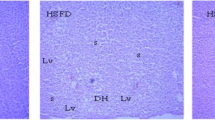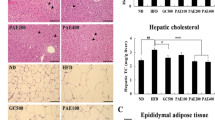Abstract
Avocado paste (AP) is the main industrial byproduct of its processing, and retains various phenolic compounds (PCs). PCs are known to normalize the plasma lipid profile, but those from avocado byproducts have been minimally studied. We report the normalizing effects of an AP-derived phenolic extract (PE) on the plasma lipid profile of male Wistar rats. A standard (SD) and high-fat diet (HFD) were formulated, and the same diets were supplemented with 1 g/kg of diet of PE (SD + PE and HFD + PE). Rats were fed these diets during an 8-week period. The HFD induced signs of dyslipidemia, but PE treatment countered the decrease in HDL. Relative mRNA expression (real-time PCR) of the hepatic HDL receptor (SCARB1) increased in both groups (SD + PE and HFD + PE), while the LDR receptor (LDLR) increased in SD + PE group. The mRNA expression of apolipoproteins APOA1 and APOB was unaffected. We conclude that PCs from AP can counter a diet-induced decrease in plasma HDL by acting on the mRNA expression of its hepatic receptor.



Similar content being viewed by others
Data Availability
The data that support the findings of this study are available from the corresponding author upon reasonable request.
References
Alqarni, M. M. M., Osman, M. A., Al-Tamimi, D. S., Gassem, M. A., Al-Khalifa, A. S., Al-Juhaimi, F., & Mohamed Ahmed, I. A. (2019). Antioxidant and antihyperlipidemic effects of Ajwa date (Phoenix dactylifera L.) extracts in rats fed a cholesterol-rich diet. Journal of Food Biochemistry, 43(8), e12933
Majdalawieh, A. F., Dalibalta, S., & Yousef, S. M. (2020). Effects of sesamin on fatty acid and cholesterol metabolism, macrophage cholesterol homeostasis and serum lipid profile: A comprehensive review. European Journal of Pharmacology, 885, 173417
Kane, J. P., Pullinger, C. R., Goldfine, I. D., & Malloy, M. J. (2021). Dyslipidemia and diabetes mellitus: Role of lipoprotein species and interrelated pathways of lipid metabolism in diabetes mellitus. Current Opinion of Pharmacology, 61, 21–27
Behbodikhah, J., Ahmed, S., Elyasi, A., Kasselman, L. J., De Leon, J., Glass, A. D., & Reiss, A. B. (2021). Apolipoprotein B and cardiovascular disease: Biomarker and potential therapeutic target. Metabolites, 11, 10
Cochran, B. J., Ong, K. L., Manandhar, B., & Rye, K. A. (2021). APOA1: A protein with multiple therapeutic functions. Current Atherosclerosis Reports, 23, 3
Ma, S. Z., Sun, W. X., Gao, L., & Liu, S. D. (2019). Therapeutic targets of hypercholesterolemia: HMGCR and LDLR. Diabetes & Metabolic Syndrome, 12, 1543–1553
Verwilligen, R. A. F., Mulder, L., Araujo, P. M., Carneiro, M., Bussmann, J., Hoekstra, M., & Van Eck, M. (2023). Zebrafish as outgroup model to study evolution of scavenger receptor class B type I functions. BBA Molecular and Cell Biology of Lipids, 1868, 6
Zeb, A. (2020). Concept, mechanism, and applications of phenolic antioxidants in foods. Journal of Food Biochemistry, 44(9), e13394
Burkholder-Cooley, N., Rajaram, S., Haddad, E., Fraser, G. E., & Jaceldo-Siegl, K. (2016). Comparison of polyphenol intakes according to distinct dietary patterns and food sources in the Adventist Health Study-2 cohort. British Journal of Nutrition, 115(12), 2162–2169
Tlais, A. Z. A., Da Ros, A., Filannino, P., Vincentini, O., Gobbetti, M., & Di Cagno, R. (2021). Biotechnological re-cycling of apple by-products: A reservoir model to produce a dietary supplement fortified with biogenic phenolic compounds. Food Chemistry, 336, 127616
Salazar-Lopez, N. J., Dominguez-Avila, J. A., Yahia, E. M., Belmonte-Herrera, B. H., Wall-Medrano, A., Montalvo-Gonzalez, E., & Gonzalez-Aguilar, G. A. (2020). Avocado fruit and by-products as potential sources of bioactive compounds. Food Research International 138, 109774.
Zuñiga-Martínez, B. S., Domínguez-Avila, J. A., Wall-Medrano, A., Ayala-Zavala, J. F., Hernández-Paredes, J., Salazar-López, N. J., Villegas-Ochoa, M. A., & González-Aguilar, G. A. (2021). Avocado paste from industrial byproducts as an unconventional source of bioactive compounds: Characterization, in vitro digestion and in silico interactions of its main phenolics with cholesterol. Journal of Food Measurement and Characterization, 15, 1–17
Corella-Salazar, D. A., Dominguez-Avila, J. A., Montiel-Herrera, M., Astiazaran-Garcia, H., Salazar-Lopez, N. J., Serafin-Garcia, M. S., Olivas-Orozco, G. I., Molina-Corral, F. J., & Gonzalez-Aguilar, G. A. (2021). Sub-chronic consumption of a phenolic-rich avocado paste extract induces GLP-1-, leptin-, and adiponectin-mediated satiety in Wistar rats. Journal of Food Biochemistry, 45(11), e13957
Preciado-Saldana, A. M., Dominguez-Avila, J. A., Ayala-Zavala, J. F., Astiazaran-Garcia, H. F., Montiel-Herrera, M., Villegas-Ochoa, M. A., Gonzalez-Aguilar, G. A., & Wall-Medrano, A. (2022). Mango “Ataulfo” peel extract improves metabolic dysregulation in prediabetic Wistar rats. Life, 12, 4
Dominguez-Avila, J. A., Alvarez-Parrilla, E., Lopez-Diaz, J. A., Maldonado-Mendoza, I. E., Gomez-Garcia Mdel, C., & de la Rosa, L. A. (2015). The pecan nut (Carya illinoinensis) and its oil and polyphenolic fractions differentially modulate lipid metabolism and the antioxidant enzyme activities in rats fed high-fat diets. Food Chemistry, 168, 529–537
Dominguez-Avila, J. A., Astiazaran-Garcia, H., Wall-Medrano, A., de la Rosa, L. A., Alvarez-Parrilla, E., & Gonzalez-Aguilar, G. A. (2019). Mango phenolics increase the serum apolipoprotein A1/B ratio in rats fed high cholesterol and sodium cholate diets. Journal of the Science of Food and Agriculture, 99(4), 1604–1612
Rotimi, S. O., Adelani, I. B., Bankole, G. E., & Rotimi, O. A. (2018). Naringin enhances reverse cholesterol transport in high fat/low streptozocin induced diabetic rats. Biomedicine & Pharmacotherapy, 101, 430–437
Yu, L., Lu, H. F., Yang, X. F., Li, R. Q., Shi, J. J., Yu, Y. T., Ma, C. Q., Sun, F. C., Zhang, S. Z., & Zhang, F. X. (2021). Diosgenin alleviates hypercholesterolemia via SRB1/CES-1/CYP7A1/FXR pathway in high-fat diet-fed rats. Toxicology and Applied Pharmacology 412, 115388
Alissa, E. M., & Ferns, G. A. (2017). Dietary fruits and vegetables and cardiovascular diseases risk. Critical Reviews in Food Science and Nutrition, 57(9), 1950–1962
Rodríguez-Pérez, C., Segura-Carretero, A., & del Mar Contreras, M. (2019). Phenolic compounds as natural and multifunctional anti-obesity agents: A review. Critical Reviews in Food Science and Nutrition, 59(8), 1212–1229
Tuzcu, Z., Orhan, C., Sahin, N., Juturu, V., & Sahin, K. (2017). Cinnamon polyphenol extract inhibits hyperlipidemia and inflammation by modulation of transcription factors in high-fat diet-fed rats. Oxidative Medicine and Cellular Longevity, 2017, 1583098
Zary-Sikorska, E., Fotschki, B., Kolodziejczyk, K., Jurgonski, A., Kosmala, M., Milala, J., Majewski, M., Ognik, K., & Juskiewicz, J. (2021). Strawberry phenolic extracts effectively mitigated metabolic disturbances associated with high-fat ingestion in rats depending on the ellagitannin polymerization degree. Food & Function, 12(13), 5779–5792
O’Morain, V. L., Chan, Y. H., Williams, J. O., Alotibi, R., Alahmadi, A., Rodrigues, N. P., Plummer, S. F., Hughes, T. R., Michael, D. R., & Ramji, D. P. (2021). The Lab4P consortium of probiotics attenuates atherosclerosis in LDL receptor deficient mice fed a high fat diet and causes plaque stabilization by inhibiting inflammation and several pro-atherogenic processes. Molecular Nutrition & Food Research, 65, 17
Retterstol, K., Svendsen, M., Narverud, I., & Holven, K. B. (2018). Effect of low carbohydrate high fat diet on LDL cholesterol and gene expression in normal-weight, young adults: A randomized controlled study. Atherosclerosis, 279, 52–61
Lu, M., Wan, Y., Yang, B., Huggins, C. E., & Li, D. (2018). Effects of low-fat compared with high-fat diet on cardiometabolic indicators in people with overweight and obesity without overt metabolic disturbance: A systematic review and meta-analysis of randomised controlled trials. British Journal of Nutrition, 119(1), 96–108
Choi, H. K., Hwang, J. T., Nam, T. G., Kim, S. H., Min, D. K., Park, S. W., & Chung, M. Y. (2017). Welsh onion extract inhibits PCSK9 expression contributing to the maintenance of the LDLR level under lipid depletion conditions of HepG2 cells. Food & Function, 8(12), 4582–4591
Pownall, H. J., Rosales, C., Gillard, B. K., & Gotto, A. M. (2021). High-density lipoproteins, reverse cholesterol transport and atherogenesis. Nature Reviews Cardiology, 18(10), 712–723
Azemi, N. A., Abu-Bakar, L., Ismail, N., Sevakumaran, V., & Tengku-Muhammad, T. S. (2021). Linoleic acid treatment increases the expression of scavenger receptor class B type 1 (SR-B1) in in-vitro model. Atherosclerosis, 331, e128
Uto-Kondo, H., Ayaori, M., Ogura, M., Nakaya, K., Ito, M., Suzuki, A., Takiguchi, S., Yakushiji, E., Terao, Y., Ozasa, H., Hisada, T., Sasaki, M., Ohsuzu, F., & Ikewaki, K. (2010). Coffee consumption enhances high-density lipoprotein-mediated cholesterol efflux in macrophages. Circulation Research, 106(4), 779–787
Lenahan, C., Huang, L., Travis, Z. D., & Zhang, J. H. (2019). Scavenger receptor class B type 1 (SR-B1) and the modifiable risk factors of stroke. Chinese Neurosurgical Journal, 5, 30
Cervantes-Paz, B., & Yahia, E. M. (2021). Avocado oil: Production and market demand, bioactive components, implications in health, and tendencies and potential uses. Comprehensive Reviews in Food Science and Food Safety, 20(4), 4120–4158
Ramos-Aguilar, A. L., Ornelas-Paz, J., Tapia-Vargas, L. M., Gardea-Bejar, A. A., Yahia, E. M., Ornelas-Paz, J. D., Perez-Martinez, J. D., Rios-Velasco, C., & Escalante-Minakata, P. (2021). Metabolomic analysis and physical attributes of ripe fruits from Mexican Creole (Persea americana var. Drymifolia) and ‘Hass’ avocados. Food Chemistry, 354, 129571
Ramos-Aguilar, A. L., Ornelas-Paz, J., Tapia-Vargas, L. M., Gardea-Bejar, A. A., Yahia, E. M., Ornelas-Paz, J. D., Ruiz-Cruz, S., Rios-Velasco, C., & Escalante-Minakata, P. (2021). Effect of cultivar on the content of selected phytochemicals in avocado peels. Food Research International, 140, 110024
Acknowledgements
D.A.C.-S. thanks Consejo Nacional de Ciencia y Tecnología (CONACyT) for the scholarship that allowed her to obtain her Master’s degree, while N.J.S.-L. thanks CONACyT for her postdoctoral fellowship.
Funding
This work was supported by CONACYT, through project “De los subproductos alimenticios de vegetales a nuevos productos de valor agregado, el papel de la tecnología en la bioeconomía” (320351); by Instituto de Bebidas de la Industria Mexicana de Coca-Cola through project “Inducción de saciedad y modulación de la digestión intestinal de lípidos ejercidos por los compuestos fenólicos de aguacate Hass” (Premio Nacional en Ciencia y Tecnología de Alimentos 2019), and by Centro de Investigación en Alimentación y Desarrollo A. C. (CIAD).
Author information
Authors and Affiliations
Contributions
G.A.G.-A.: conceptualization, funding acquisition, investigation, project administration, resources, supervision, conceptualization, methodology, writing—original draft; J.A.D.-A.: conceptualization, data curation, formal analysis, funding acquisition, methodology, project administration, writing—original draft, writing—review and editing; N.J.S.-L. and M.M.-H.: formal analysis, investigation, methodology, writing—review and editing; D.A.C.-S. and H.A.-G.: formal analysis, investigation, writing—original draft, writing—review and editing; J.R.-G. and M.A.V.-O.: investigation, methodology, project administration, supervision.
Corresponding author
Ethics declarations
Conflict of Interest
The authors declare no competing interests.
Ethical Approval
The experimental protocol was reviewed and approved by the Bioethics Committee of the Research Centre for Food and Development (CIAD) (CE/014_1/2019), and followed national and international guidelines applicable for animal experimentation.
Additional information
Publisher’s note Springer Nature remains neutral with regard to jurisdictional claims in published maps and institutional affiliations.
Supplementary information
Rights and permissions
Springer Nature or its licensor (e.g. a society or other partner) holds exclusive rights to this article under a publishing agreement with the author(s) or other rightsholder(s); author self-archiving of the accepted manuscript version of this article is solely governed by the terms of such publishing agreement and applicable law.
About this article
Cite this article
Domínguez-Avila, J.A., Salazar-López, N.J., Montiel-Herrera, M. et al. Avocado Paste Phenolics Mitigate a High-Fat Diet-Induced Plasma HDL Decrease in Male Wistar Rats, by Altering the mRNA Expression of Hepatic SCARB1. Cell Biochem Biophys 82, 119–126 (2024). https://doi.org/10.1007/s12013-023-01190-9
Received:
Accepted:
Published:
Issue Date:
DOI: https://doi.org/10.1007/s12013-023-01190-9




